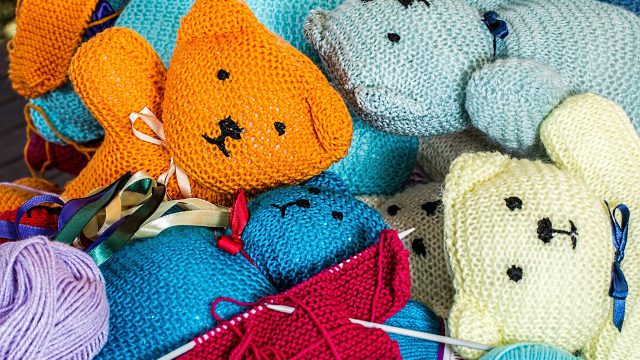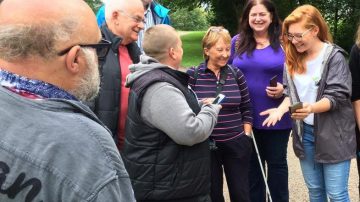I (a twenty-four-year-old male) recently took up knitting after a lifetime of considering it an ‘old-lady thing’. I think this stereotype was born after I failed to master the craft despite my Nan’s best efforts to ingrain knit and purls into my brain. Maybe my stereotyping of knitting was mainly out of spite, putting it in an age bracket that I wasn’t part of as if I wasn’t supposed to be doing it – when it was actually due to my lack of patience or skill. Anyway, a colleague finally got me knitting and here I am selfishly wondering about the benefits of it to my own mental health.
It turns out that knitting actually has a rather significant effect upon one’s health, according to The Independent knitting has been shown to decrease chronic pain, slows the speed of dementia and even has the ability to lessen the effects of depression. The article also cites a study by Harvard in 2007 which compared knitting to yoga for its calming effect. Another study by Riley, Corkhill and Morris in 2013 discovered that people who knitted more reported feeling calmer and more content.
Now, I know the trivialisation of mental health problems being magically fixed by yoga or mindfulness is highly debated, but I see mental health to be equal to physical health – different treatments and techniques can have big effects without ‘medical’ intervention. Just look at cycling – according to the NHS, it can reduce the risk of heart disease and diabetes from undertaking less than 3 hours of cycling a week.
But I was wondering exactly why hobbies like knitting could make more of a difference when it comes to calming your anxiety than perhaps activities like watching a TV show (or delving deep into the suggested video feed on Facebook for several hours…). You’d imagine it has something to do with the fact you can passively watch something, and your mind is allowed to wander, whereas with something like knitting you’ve got to give it your full attention to do it successfully. There’s also something to be said for any activity that requires a rhythm – I find a knitting pattern mesmerising once I’ve gotten myself into it. But even with that rhythm, it requires your upmost concentration.
The awful attribute of Brits is that we’re closed off and stiff-upper lipped, but I think hobbies such as knitting can have a social aspect if done in groups – which was also found in the aforementioned Riley, Corkhill and Morris, 2013 study. All manner of hobbies allows for participants to have a purpose when they meet up and an opportunity to talk about life. The positive benefits of talking about your mental health doesn’t always mean you have to be discussing your health directly, but having that close knit (I’m sorry, I had to!) support group can give you the courage to talk when and if you have to.
Slightly moving away from knitting, maybe it’s these social hobbies we need to start undertaking. In one of my previous stories about mental health and university, I highlighted the dramatic rise of university students with mental health conditions and University life seems to orientate around groups and societies – both Universities’ in our city even have their own knitting/craft societies (Knit Like your Nana and Stich Society). Maybe Universities can serve as a Petri dish under a microscope to demonstrate how supportive communities can be built through common interests and hobbies – I think those communities, our families and our friends are one of the best hopes when tackling the current mental health crisis that we all face as a society.
And I think I’ll bind off that story right there. (I just wanted one more knitting pun!)



